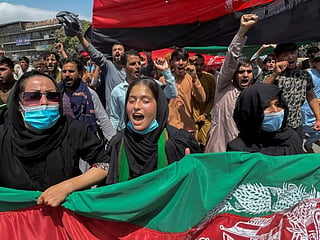Why America needs to actively engage with Taliban
Western sanctions against Taliban-ruled Afghanistan could prove to be counterproductive

After two decades the Taliban is back in power in Kabul. Its victory has been swift and, in most cases, without much fight.
Except for the Panjshir Valley, most of Afghanistan has already come under the Taliban control. There are reports that the opposition holding up in the Tajik-dominated province is also crumbling.
The US had defeated the Taliban comprehensively in 2001 when it invaded the country. Instead of leaving, the US stayed on and engaged in its fancy nation-building project.
Despite spending more than $2.3 trillion and losing more than 6000 of its troops and contractors, the US received a crushing defeat at the hands of the Taliban after two decades.
Instead of engaging in serious introspection to find out what went wrong, the US primarily blames others for its defeat. Passing the buck to the former Afghan government and its President does not absolve the US from its responsibility.
It was the US, which was directly or indirectly running Afghanistan for the last 20 years. The number of Afghans living in poverty has doubled under its watch, and the areas under poppy cultivation have tripled. The human cost of the Afghan war has been staggering.
For the two decades, the war in Afghanistan has not only ended more than 43,000 innocent civilian lives, but the continued armed conflict has also displaced millions of people, destroyed basic infrastructure, and created public health crises.
The country is littered with unexploded explosive devices due to carpet bombing. In 2001, in the Human Development Index global ranking, Afghanistan was 162; in 2020, it even came down to 169.
Afghanistan’s agricultural crisis is acute. The conflict has made it impossible to promote and practice sustainable agricultural production.
More than one-third of Afghans are acutely and severely food insecure. Half of Afghanistan’s population doesn’t have access to safe drinking water. Despite the huge potential of renewable energy production, only one-third of the country’s population avails electricity.
While the world is occupied in analysing the loss and gains of various global and regional powers due to the US troop withdrawal and the Taliban victory, Afghanistan is staring at a massive humanitarian crisis.
A face of moderation and reconciliation
Despite the Taliban trying to project a face of moderation and reconciliation, not many are prepared to believe them, considering their previous record.
While politically savvy Mullah Abdul Ghani Baradar has become the face, the complete absence of the Supreme Leader Haibatullah Akhundzada from the spotlight has added further doubts over Taliban’s real agenda.
Overall, it is not possible to speculate whether the Taliban has changed its character and become a moderate nationalist force, or it continues to believe in establishing a rigid religious order as it used to before. No one should expect the Taliban to be inclusive and democratic.
Even if the Taliban is the same old Taliban, the use of force or coercion to defeat it is not anymore an option. After such a humiliating defeat, no sensible American leader can think of sending US troops again to that country. So, what should the US do? Can it afford to continue to fight against the Taliban or abandon Afghanistan?
The Taliban, in recent years, have tried to project themselves as a nationalist force, not a group of militants drawing its cadres from the Sunni Pashtun tribe.
They have recruited many Tajiks, Uzbeks, and Hazaras fighters. In this context, the hope of successful internal resistance against the Taliban is also improbable.
Bringing peace and reconciliation
By supporting emerging localised resistance in the Panjshir Valley, the US can only prolong the conflict, but it does not have the potential to overthrow the Taliban from Kabul.
Even in 2001, Tajiks from the Panjshir Valley were not able to do so despite Taliban being less acceptable both outside and inside Afghanistan.
The other option for the US is to enforce economic sanctions against the country and even impose some targeted sanctions against the Taliban leadership.
Getting a global sanction regime against the Taliban currently is an impossibility. The Taliban is neither as isolated as it was in the 1990s, nor is there any unity among the veto-carrying members of the UN Security Council.
On the other hand, any American or Western sanctions against the Taliban-ruled Afghanistan will be counterproductive. The Taliban are pretty astute in creating an informal economy.
The sanctions will bring more legitimacy and even offer a cover to hide their failure in providing essential services. These sanctions have in the past failed and continue to fail against similar types of regimes in other countries. The only ones who will suffer from it are again the Afghan people.
The best possible option for the US and the West is to actively engage with the Taliban regime in Afghanistan. By doing so they will stop the competing powers from getting an open field, and there is every likelihood of having considerable influence on the Taliban to follow a policy of moderation.
Moreover, this will help Afghanistan come out of four decades of war, and peacebuilding can genuinely begin in the country.
US should actively engage in bringing peace and reconciliation, and not wait for three decades to do so as it had in the case of Vietnam. Afghans have suffered terribly due to global power politics for at least four decades; it must come to an end.









